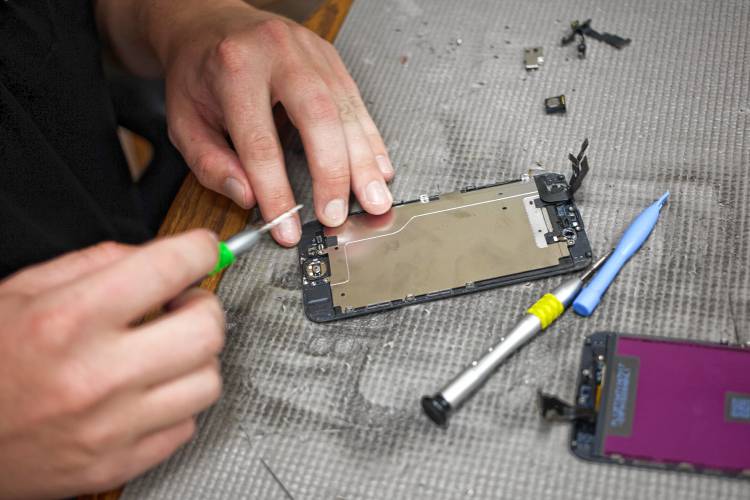If you’re not the sort of person who gets worked up over the issue known as digital right to repair, Chad Johansen has an image that might change your mind.
“Imagine if you changed the oil in your car and when your car notices that you did it yourself, (that) you didn’t bring it into an authorized service center, your car won’t start, your car doesn’t run any more,” said Johansen, who owns a company called N.H. iPhone Repair, which has opened three storefronts in its six years of existence.
The oil-change scenario is roughly the situation facing Johansen’s company, as well as owners of iPhones and many other electronic devices, including things you don’t consider to be electronic devices, such as farm tractors. As software takes over tasks once done by old-fashioned machinery, companies are building systems or designing hardware components that deliberately get in the way of tasks which owners of equipment used to be able to do.
“A prime example is the iPhone 7, iPhone 8: …You’ve got the home button on it and if you damage that home button, the phone becomes a brick. But the user cannot replace it, you have to take it to Apple,” said Johansen.
Why not take it to Johansen’s firm, which might be closer and cheaper?
This trick isn’t done just by Apple; it’s endemic in modern electronic devices.
“I have degree from MIT in electrical engineering and computer science, yet I can’t even easily replace the battery in my cellphone,” said David Luneau, a state representative from Hopkinton.
Luneau is one of the sponsors of a “digital electronic product repair” bill that will be considered by the Legislature this year. It would require companies to do such things as provide device buyers and third-party shops with diagnostic and repair information – stuff that used to be included in instruction manuals – and also provide updates of firmware that is embedded in devices.
Basically, the proposed legislation (currently an LSR, a sort of proto-legislation, number 2385) wants to keep manufacturers from doing anything that unreasonably gets in the way of you, me or an independent repair shop from fixing or tinkering with a device after it has been paid for.
“The idea is not to enable hacking, not to enable modification of devices or any sort of back-door codes,” Luneau said. “Owners of these products should have access to the repair information.”
“It is certainly pro-small business,” said Luneau. “As these products get to be more complex, the ability for independent repair stations to help out customers and prolonge the life of these very expensive items … gets harder.”
One result, he said, is that a lack of competition from local repair shops means that fixes from the manufacture are costly, which makes it more likely that people will just throw away an item, costing them money and clogging up our landfills.
Similar right-to-repair bills have been passed or proposed in a dozen states including Massachusetts, which in 2012 passed a limited version that applied only to automotive repair but is considering a more sweeping version this year.
They are part of a bigger pushback against the way software has shifted control of the things we buy.
“You buy a thousand-dollar phone and if you open it because you’re interested in tinkering, you found the parts online and want to try it yourself – well, you can’t. So who owns it? You can’t even open it up – do you really own it?” Johansen asked.
If you want to learn more, visit the website called Repair.org, a loose lobbying effort for bills like this one.
This question has bounced around the geek community for many years involving software in response to “digital rights management” and other software tools that mean it’s harder to do things with digital songs that are easy with vinyl LPs, such as lending them to other people.
It’s not just music fans and smartphone users who are irritated, however. Perhaps surprisingly, farmers have been one of the most outspoken groups in this arena. The New Hampshire Farm Bureau is among the groups interested in some form of right-to-repair legislation.
Their problem is that tractors, combines and other farm equipment are increasingly computerized. Farmers have a long tradition of fixing their own equipment – you can’t wait around for a mechanic to show up if you need to get the hay in before it rains – and they are in up arms because they often can’t work on computerized systems, forcing them to wait days for a certified technician when a combine breaks. This has resulted in such things as semi-organized online groups gathering software from Eastern Europe to hack into the systems of John Deere machines.
The proposed bill has to make a long route through committee hearings before it might be considered, which means the actual language is likely to morph even if it survives the journey.
But if all goes as backers hope it will, perhaps someday it will be easier to perform radical and earth-shaking technological feats. You know, like replacing the battery in your phone.


 Return to the Concord Monitor
Return to the Concord Monitor
Great bill! Monopolies on repairs are outrageous. It’t not like we haven’t already paid for the electronics that break down!
Rep.Betty Gay